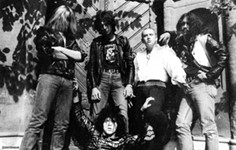Look/Book
Scenes from the 2010 Texas Book Festival
By Kimberley Jones, Fri., Oct. 22, 2010
"It is a very mystical experience to see a 100-foot wave," The Wave: In Pursuit of the Rogues, Freaks and Giants of the Ocean author Susan Casey said on the subject of her latest book, rogue waves, a phenomenon the scientific establishment didn't even acknowledge until not too long ago. If you'd witnessed one, Casey pointed out, then you probably didn't survive it. Eventually, though, the establishment caught on. "It took a little quantum physics and chaos theory to explain."

"I joked when I was writing the book that I should call it Chicken and Dessert," New York Times food writer Amanda Hesser said at the Cooking Tent; the eventual title was the staid-sounding The Essential New York Times Cook Book: Classic Recipes for a New Century. Hesser combed through decades of recipes printed in the Times, from German toast to New England Spider Cake to Saratoga potato chips. One of the revelations of the project, she said, was the timeliness of what we consider to be new trends. "The whole idea that we learned about olive oil in, like, 1982? Not true."

Jennifer Egan spoke at length about the rules she set for herself in tackling her latest book, A Visit From the Goon Squad, including the dictum that every chapter have a completely different feel to it. "My model was like the mood [of] the Seventies concept album – Tommy, Quadrophenia, Ziggy Stardust," she laughed. "I'm really dating myself here."

The question most audiences lob at Cutting for Stone: A Novel author and infectious diseases specialist Dr. Abraham Verghese is how he finds the time to write. Easy, he said: "I think I'm the only physician in Northern California who doesn't play golf. That opens up oodles of time." Verghese, who frankly charmed the pants off the crowd, confided that you should never show a first draft to your wife or your mother. "The moment your spouse becomes deeply disturbed by your voice," he said, "you have found your voice."

University of Texas professor S. Craig Watkins cited his interest in the "intersection between youth culture, technology, and media" as the driving force behind his book The Young and the Digital: What the Migration to Social Network Sites, Games, and Anytime, Anywhere Media Means for Our Future. Just how digital? His introducer, Bob Carlton, said Twitter had clocked a jaw-dropping 160,000 tweets about the festival in progress.

"The first 10 people who show up, he'll sign [their book] in blood," joked moderator and Texas Monthly Senior Editor Jeff Salamon when he introduced Justin Cronin (r), the Houston-based author of bestselling vampire epic The Passage: A Novel. "There's a lot of Texas in the book, and [the state] ultimately will play a big part in the Passage trilogy," Cronin said. "I set up Kerrville as the sort of last bastion of humanity. Texas gets to save the world in the end. So, thank you, Texas."

At the Vintage/Anchor Books Presents Writers on Reading panel, Commencement: A Novel author J. Courtney Sullivan said she sticks with reading poetry when she's working on a novel: "Sometimes for me reading one W. H. Auden poem is better than reading three novels."

When writing her memoir, Let's Take the Long Way Home: A Memoir of Friendship, about her friend Caroline Knapp, who died of cancer in 2002, Gail Caldwell (left, with Emily Fox Gordon) said she looked often to a picture of Knapp in her office to ask her, "Am I doing okay?" Still, Caldwell pointed out, memoir isn't the only potentially sticky writing format, ethically speaking. "Let's talk about the crimes committed in the name of fiction," she said, fingering Philip Roth and John Updike. "They barely changed the names."









